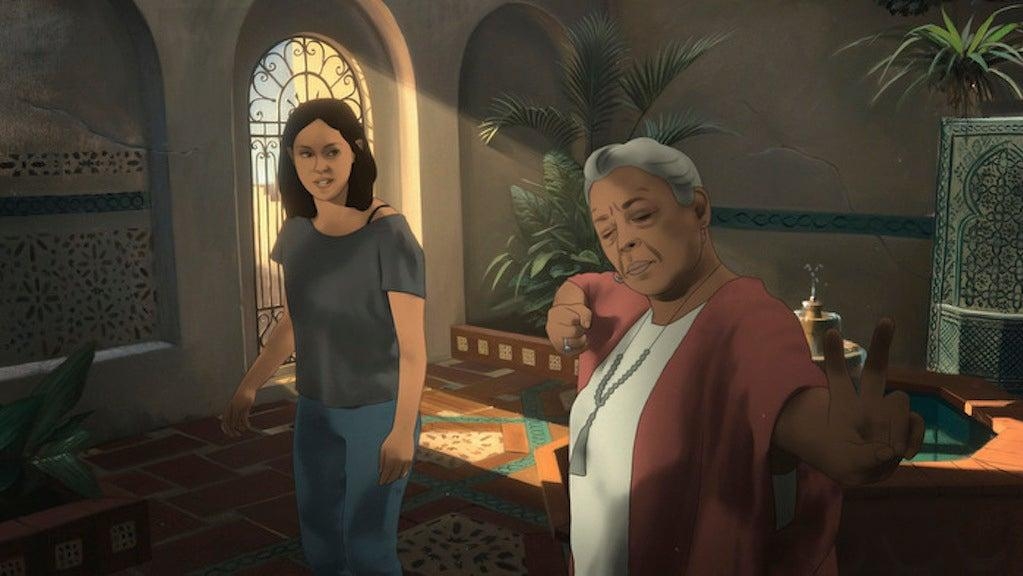Undone season 2 brilliantly mines the thorniness of mother-daughter relationships
Prime Video's rotoscope-animation series returns with a trippy tale of intergenerational traumas

There’s nothing else on TV that blends form and function quite like Undone, the Prime Video series that uses stunning, painterly rotoscope animation to evoke a world where nothing is fixed, existence is fluid, and the fantastical weaves itself around and through the mundane like a creeping vine. And luckily for us, the show, which comes from the minds of Raphael Bob-Waksberg and Kate Purdy, who earned their adult-animation bona fides with the remarkable black comedy BoJack Horseman, is back for a second season after a nearly three-year hiatus.
The series follows Alma Winograd-Diaz (Rosa Salazar), a twentysomething woman who, in the first season, woke up from a car accident to find that she’d become unstuck in time and space. Alma began to question the nature of her reality, not sure whether she was channeling shamanistic magic or showing signs of schizophrenia. She was visited by visions of her long-dead father, Jacob (Bob Odenkirk), who tried to teach her to harness her powers so she can change her fate. Meanwhile, her pragmatic sister Becca (Angelique Cabral), mother Camila (Constance Marie), and boyfriend Sam (Siddharth Dhananjay) tried to pull Alma back into the tangible world and come to grips with what they perceived to be her mental illness.
Cut to the start of season two, as Alma waits in a strange limbo to find out whether her bid to rewrite the past worked. We won’t spoil the outcome here—but suffice to say that there’s plenty more Winograd-Diaz family drama on the way. This season turns its focus on Camila, exploring the secrets that she’s been hiding from her adult children. If the first season was all about the void the loss of a patriarch leaves behind, the second tackles the thorniness of mother-daughter relationships. And as Alma and Becca investigate this latest ancestral mystery, she discovers that she and her dad aren’t the only ones in the family who can go reality-surfing.
Series director Hisko Hulsing, as we mentioned, uses rotoscoping—a painterly animation style that involves tracing over recorded footage—to create a world that, as seen mostly from Alma’s perspective, is constantly in flux. (It’s a style that will be familiar to fans of Richard Linklater’s similarly trippy Waking Life, A Scanner Darkly, and Apollo 10½: A Space Age Childhood.) Hulsing uses the technique as a means of stretching, twisting, and re-forming reality like Play-Doh: Empty hallways become infinite mirrors; characters flicker between their childhood and adult selves; history quite literally bleeds through the cracks of the current moment. In the show’s world, the walls between past, present, and future—and between the concrete and the visionary—are porous.
Between A24’s acclaimed Everything Everywhere All At Once glitter-bombing indie cinemas and Marvel’s upcoming Doctor Strange in the Multiverse of Madness selling out theaters weeks in advance, the multiverse is most definitely having a moment. But there’s an intimacy to Undone that makes it uniquely suited to the small screen. Alma isn’t using her gifts to save the entire world; she’s focused on getting to the bottom of mysteries within her own family: the lost histories and intergenerational traumas that shaped her into the person she became.
A big part of what makes Undone so compelling is Alma herself. As played by Salazar, she’s a charming, messy, flawed protagonist with a wry sense of humor and an intense yearning to be understood. “Don’t get crumbs on my rug,” a character warns Alma. “Wow. You care way too much about this reality,” she deadpans in reply.
The second season tightens its focus on Alma and Becca’s relationship, as Alma pushes her more pragmatic sister to explore her own shamanic abilities. The two fall into other people’s memories and hop through time, sure; but their sibling dynamic feels grounded and naturalistic. As in the best genre stories, the magic they do together is in service to the tale of their relationship, and not the other way around.
What’s more, Alma’s frustration with those around her willfully turning their backs on the fantastical—and demanding that she do the same—is a potent metaphor for what it’s like to live in the world as a neurodiverse person, constantly being asked to conform to “normal” standards no matter the cost. As they did on BoJack, Bob-Waksberg and Purdy stretch the limits of animation to evoke the peaks and valleys of mental illness in a way live action never could.
But really, there’s no sense trying to explain Undone. It’s a hallucinogenic family dramedy that’s made to be seen and experienced, an ouroboros devouring its own tail—and enjoying every bite.